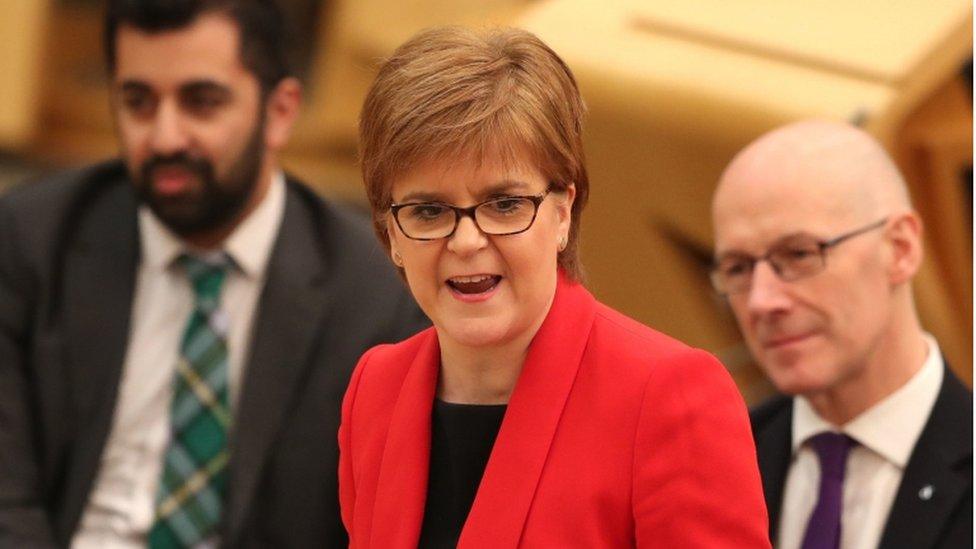Tax rows and Christmas jumpers
- Published

It was quite a sight, I can tell you. There I was, quietly mopping my fevered brow after broadcasting to an astonished nation (or at least that portion of the nation which accompanies me in spectating on First Minister's Questions.)
I wheeled round and there I perceived a selection of senior MSPs, struggling to don knitwear. One by one, they forced themselves into colourful, nay lurid, gansies, bedecked with holly and sundry Santas.
A few inquiries soon disclosed that this was to mark Christmas Jumper Day, promoting children's charitable work. To which endeavours, all power.
Once bejumpered, they all stood about, grinning, for all the world like a 1960s folk group. Any second now, I thought, it will be fingers to the ears and a verse of The Wild Rover.
Finally, the lead singer arrived as Nicola Sturgeon glided down the stairs.
Not for the FM the turmoil of donning a jumper in public. Wisely, she had sent a staffer ahead to select an item of clothing - no doubt the smartest - and she had assumed the mantle, in private. Smart, eh?
And Ms Sturgeon displayed a comparable assiduity in tackling questions today. To each inquiry about the budget, she challenged her interlocutors.
If you want more spending on X, what would you cut? Y or Z? If you want to raise less in tax, what would you shelve? On the day, it was decidedly effective.
Behavioural responses
Firstly, she sparred with Jackson Carlaw over tax. The Tories are unhappy with the proposal to levy more from middle and upper earners than is the case in England.
On which topic, the Scottish Fiscal Commission suggested today that some folk might think twice about the prospect of moving to Scotland, given that potential financial disincentive. To emphasise, they were not making a particular fuss over this question, simply noting it.
Ms Sturgeon insisted that behavioural responses had been taken into account in calculating the tax plans. Now was not the time, she said, to cut taxes for those with the most.
The FM turned to light satire in dealing with Labour's Richard Leonard. He argued for more expenditure on benefits, to mitigate UK cuts.

Ms Sturgeon's minority government will need to strike a deal with another party - most likely the Greens - if it is to pass its budget
Ms Sturgeon suggested that there were limits, not political but arithmetical, constraining such action. And she argued, mischievously, that Labour's budget plans had contained an error in calculation. Assuming her most solicitous glance, she offered to help with the sums.
Perhaps the most interesting exchange was with Patrick Harvie of the Greens. They are the most likely buddies for the Scottish government in forming a majority for the budget.
Mr Harvie said he would need a clear direction of travel towards reform of local government finance. Not an instant plan. Not immediate implementation. But a signpost.
The FM was emollient. She hoped for a deal and suggested that it might indeed involve the transfer of further financial powers to local authorities.
But neither she nor Derek Mackay, the finance secretary, want to go too far. They know that the political history of local government financial reform is less than glorious. Hence their caution and the prospect that negotiation will be tricky.